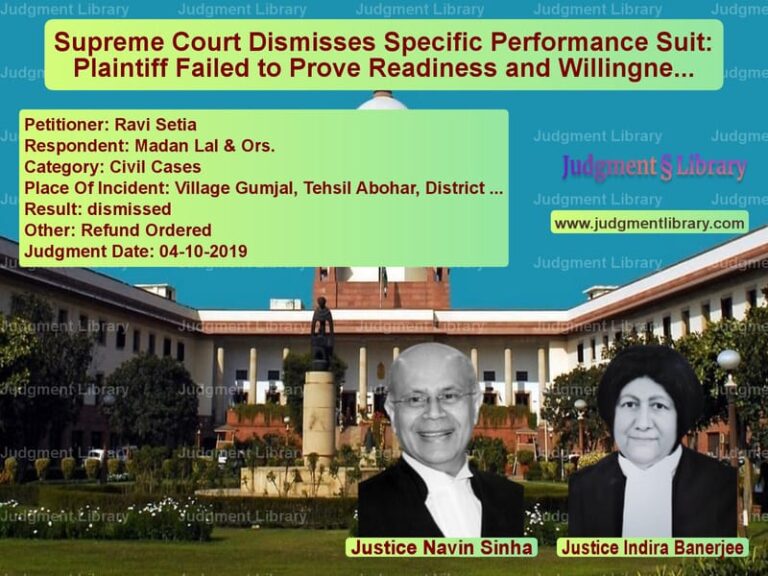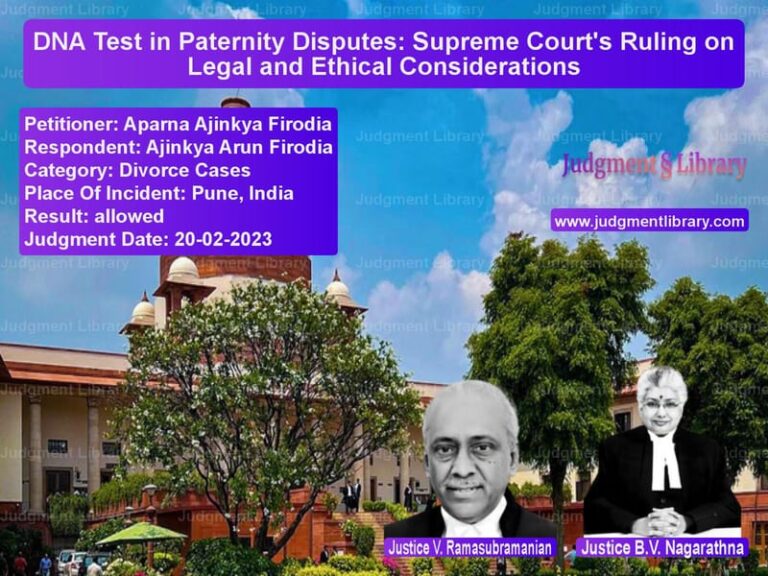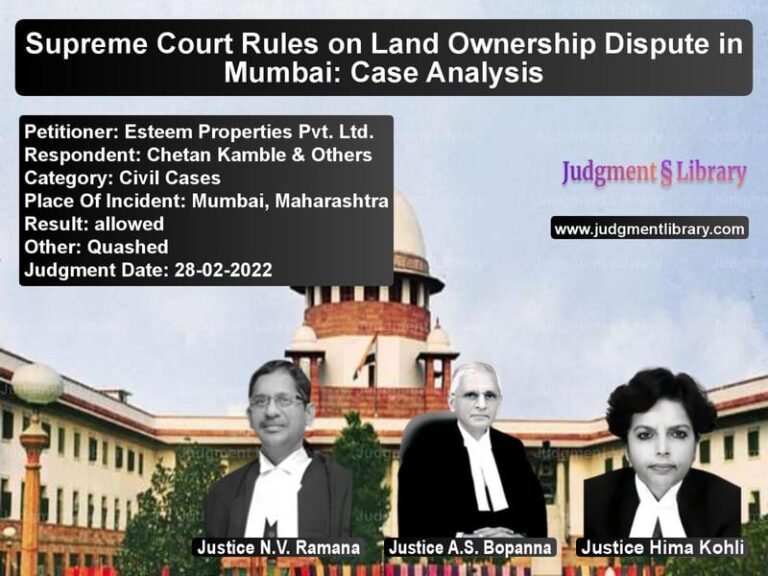Cheque Bounce Case: Supreme Court Reinstates Conviction Under Negotiable Instruments Act
The Supreme Court of India, in the case of Bir Singh vs. Mukesh Kumar, delivered a significant judgment concerning Section 138 of the Negotiable Instruments Act, 1881, which deals with the dishonor of cheques. This case revolved around a financial transaction where a cheque issued by the respondent was dishonored due to insufficient funds, leading to criminal proceedings. The Supreme Court reinstated the conviction of the accused after the High Court had earlier acquitted him.
Background of the Case
The dispute arose when the appellant, Bir Singh, claimed that the respondent, Mukesh Kumar, had issued a cheque of Rs. 15 lakhs dated March 4, 2012, drawn on Axis Bank, Palwal, to repay a friendly loan. However, when the appellant presented the cheque for clearance, it was dishonored due to “insufficient funds”. The appellant re-presented the cheque on May 23, 2012, but it was again returned unpaid.
Following the dishonor, the appellant sent a legal notice to the respondent on June 15, 2012, demanding payment. Despite the notice being served, the respondent neither replied nor paid the cheque amount. Consequently, the appellant filed a criminal complaint under Section 138 of the Negotiable Instruments Act.
Trial Court’s Decision
The Judicial Magistrate, 1st Class, Palwal, after examining the evidence, convicted the respondent and sentenced him to:
- One year of simple imprisonment.
- A compensation payment of Rs. 15 lakhs to the appellant.
Sessions Court Appeal
The respondent appealed the conviction before the Additional Sessions Judge, Palwal. On February 20, 2016, the appellate court upheld the conviction but reduced the imprisonment term from one year to six months, while maintaining the compensation order.
High Court Proceedings
The respondent then filed a criminal revision petition before the Punjab and Haryana High Court, challenging the conviction. The appellant also filed a revision petition seeking to restore the original one-year imprisonment.
In a surprising turn, the High Court acquitted the respondent, ruling that the appellant and respondent shared a fiduciary relationship. The High Court held that the appellant, being an income tax practitioner, failed to provide sufficient proof that the cheque was issued in repayment of a loan. It concluded that the appellant might have misused a blank cheque given by the respondent for tax payments.
The High Court’s reasoning was:
- The appellant was in a fiduciary relationship with the respondent.
- There was no documentary evidence of the Rs. 15 lakh loan.
- The cheque was possibly given for tax-related purposes and not as loan repayment.
- The loan amount was not reflected in the appellant’s income tax returns.
Based on these findings, the High Court reversed the conviction and acquitted the respondent.
Supreme Court’s Analysis and Judgment
The appellant challenged the High Court’s ruling before the Supreme Court, arguing that the High Court wrongly interfered in a case where the trial and appellate courts had already found the accused guilty.
The Supreme Court observed:
“The High Court has erred in reversing the concurrent factual findings of the trial and appellate courts. A mere fiduciary relationship does not negate the legal presumption under Section 139 of the Negotiable Instruments Act.”
The Supreme Court reaffirmed that:
- Section 139 of the Negotiable Instruments Act creates a presumption that a cheque is issued in discharge of a legally enforceable debt or liability.
- The burden of rebutting this presumption lies on the accused, who must provide cogent evidence.
- Mere allegations that a cheque was misused do not suffice to rebut the legal presumption.
- The accused did not provide sufficient proof that the cheque was given for tax purposes rather than as loan repayment.
Additionally, the Court referred to its ruling in Hiten P. Dalal vs. Bratindranath Banerjee, emphasizing:
“Once the execution of the cheque is admitted, there is a legal presumption that the cheque was issued for discharging a debt. This presumption can only be rebutted through compelling evidence, which the respondent failed to provide.”
Accordingly, the Supreme Court overturned the High Court’s acquittal and reinstated the conviction.
Final Judgment
The Supreme Court:
- Confirmed the conviction of the respondent under Section 138 of the Negotiable Instruments Act.
- Replaced the imprisonment with a fine of Rs. 16 lakhs to be paid as compensation to the appellant.
- Ordered that if the respondent fails to pay the fine within eight weeks, the original one-year imprisonment sentence will be restored.
Impact of the Judgment
The ruling in Bir Singh vs. Mukesh Kumar reinforces several crucial principles of negotiable instrument law:
- Presumption in Favor of the Holder: The judgment clarifies that courts must presume that a cheque was issued to discharge a debt unless the drawer provides concrete evidence to the contrary.
- Limited Scope for High Court Interference: High Courts cannot arbitrarily overturn trial court findings unless there is a manifest error.
- Blank Cheque Misuse Defense Weakened: The Court held that even if a signed blank cheque is issued, the onus lies on the accused to prove that it was misused.
- Reduction in Imprisonment: By substituting the jail term with a monetary penalty, the Court emphasized compensation over punishment in cheque bounce cases.
Conclusion
The Supreme Court’s ruling in Bir Singh vs. Mukesh Kumar is a landmark judgment that strengthens the enforceability of Section 138 of the Negotiable Instruments Act. By reinstating the conviction and emphasizing the presumption in favor of cheque holders, the judgment provides clarity and security for financial transactions. It serves as a strong deterrent against dishonored cheques while ensuring fair trial principles are upheld.
Petitioner Name: Bir Singh.Respondent Name: Mukesh Kumar.Judgment By: Justice Indira Banerjee, Justice R. Banumathi.Place Of Incident: Palwal, Haryana.Judgment Date: 06-02-2019.
Don’t miss out on the full details! Download the complete judgment in PDF format below and gain valuable insights instantly!
Download Judgment: Bir Singh vs Mukesh Kumar Supreme Court of India Judgment Dated 06-02-2019.pdf
Direct Downlaod Judgment: Direct downlaod this Judgment
See all petitions in Cheque Dishonour Cases
See all petitions in Damages and Compensation
See all petitions in Judgment by Indira Banerjee
See all petitions in Judgment by R. Banumathi
See all petitions in allowed
See all petitions in Modified
See all petitions in supreme court of India judgments February 2019
See all petitions in 2019 judgments
See all posts in Civil Cases Category
See all allowed petitions in Civil Cases Category
See all Dismissed petitions in Civil Cases Category
See all partially allowed petitions in Civil Cases Category







